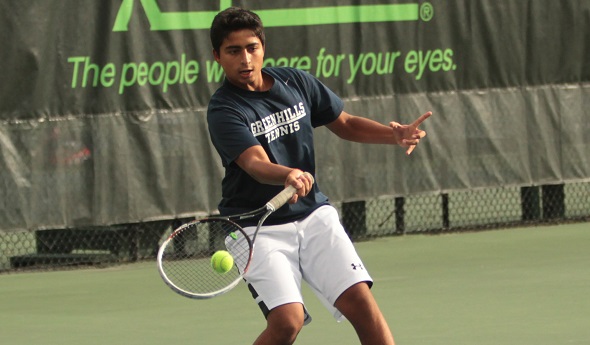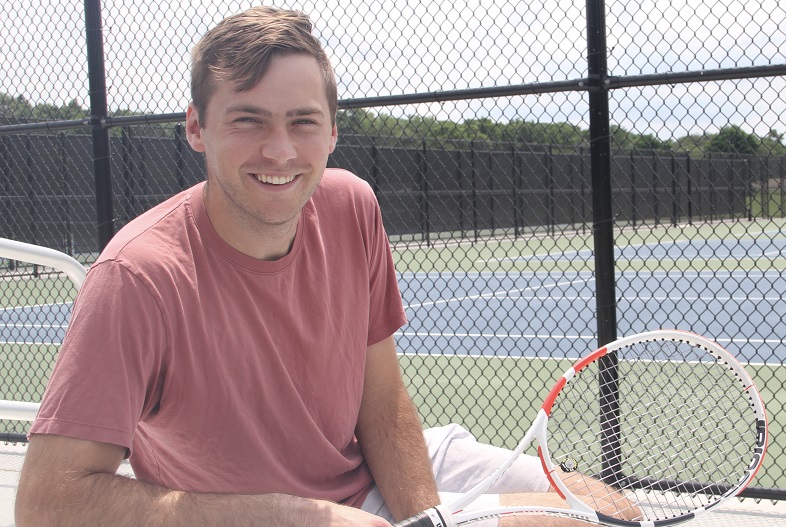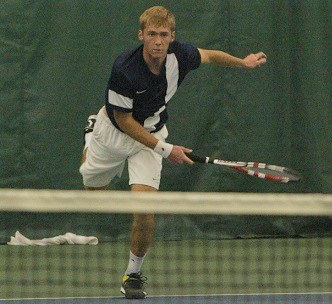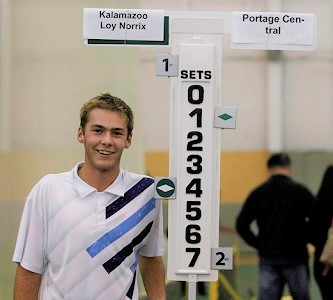
Greenhills Pursues '9' with Proven Formula
By
Chip Mundy
Special for Second Half
August 26, 2016
By Chip Mundy
Special for Second Half
ANN ARBOR – Ann Arbor Greenhills boys tennis coach Eric Gajar was quick with a response when asked about his team's secret to its current eight-year run as the MHSAA Division 4 champion.
 “The secret is having good players,” he said with a smile.
“The secret is having good players,” he said with a smile.
Gajar, in his 22nd season as Greenhills coach, probably should have said, “The secret is having a lot of good players.” And that is the reason why Greenhills, which lost five key players from last year's championship team, is primed to make a run at a ninth consecutive title.
Gajar was in a similar position in 2011, having lost six players from the team that captured title No. 4 in its current streak.
“That was a year when I thought we were going to rebuild, hold our own and see how we could do,” he said. “A couple of teams beat us in the regular season, and even leading right up to the state tournament we were not seeded to win it. But we were certainly a contender, and we ended up winning that one.
“This is similar situation with missing five guys out of 12.”
While the roster is nearly half empty of regulars from last year, the players who are back and the continued reloading of the program still make the optimism much more than half full.
Gajar will certainly miss Gage Feldheisen, who won an individual Finals title at No. 4 doubles as a freshman and then won three consecutive singles titles – and he did it without losing a match to a Division 4 opponent during his career. Brandon Johnson, a three-time Finals champion in doubles, including the past two at No. 1 doubles, also has graduated, as has Connor Todd, who won at No. 2 doubles last year.
In addition to the losses of Feldheisen, Johnson and Todd, Greenhills will be without Amar Nigam and Kris Gulvezan, who teamed to win No. 4 doubles last year.
Having five MHSAA champions who won't be around to defend their titles certainly is a hit to Greenhills, but nobody is feeling sorry for the Gryphons, who have some excellent returning players and two potentially impactful freshmen.
Depth is the key
For a team to win eight consecutive titles, it takes more than a few good players. To put it in perspective, the seniors on this year's team were in the third grade the last time Greenhills failed to win an MHSAA team championship.
“Ann Arbor is a great tennis community,” Gajar said. “These guys grow up playing, and the clubs here do a great job grooming these guys from the time they were 5 of 6 years old. Then they play with all the kids from Pioneer, Huron, Skyline, and all these local guys they grew up playing against were very good players from big schools, so that's part of it.”
The true sign of a tennis team with depth is how it performs at the lower singles and doubles matches. In that category, Greenhills shines.
 During its recent streak of championships, Greenhills has won flight titles at No. 4 singles and No. 4 doubles seven years in a row. Greenhills has won 37 combined singles and doubles Finals titles over the past eight seasons, and 21 came in doubles.
During its recent streak of championships, Greenhills has won flight titles at No. 4 singles and No. 4 doubles seven years in a row. Greenhills has won 37 combined singles and doubles Finals titles over the past eight seasons, and 21 came in doubles.
That's depth.
That also is Gajar's background. As a player at Ann Arbor Pioneer, Gajar played doubles and twice made it to the MHSAA championship match only to lose. So he is not bashful when he talks of the pride he takes in working with the doubles teams.
“Doubles certainly is a key part to our success, and that's because of our depth,” he said. “We compete against bigger schools all year long, and they have very good, strong deep rosters, so our doubles guys see high levels of players. We have more depth than teams that are our size.
“I'm such a doubles player – I don't have the patience or the stamina to play singles – so I've always played doubles and loved doubles. Two-thirds of the team is doubles, so we tell these guys when they step into the program from the JV, 'You're probably going to be a doubles player, unless you play your way into a singles spot.' I don't sell it as a demotion.
“Certainly they come to us having played quite a bit, and the middle-school coaches have done a good job of coaching sixth through eighth graders, and then Bob Newton our JV guy gets them ready and works on their stuff for doubles because they usually move up to our program from that.
Experience and youth
One could say that Greenhills is still loaded and is reloading this year.
Junior Sonaal Verma is back at No. 1 singles after advancing to the Division 4 semifinals last year before losing to the top-seeded player.
“He certainly is a key, and he is looking as good as ever to us,” Gajar said.
All three of the senior captains – Matt Chatas, Andy Xie and Sam Talsma – are former MHSAA Finals champions. Xie and Chatas teamed to win the No. 3 doubles title as freshmen, and Xie added the title at No. 2 doubles as a sophomore and the No. 4 singles crown last year.
This year, with a pair of talented freshmen slated to singles duty, Xie will return to doubles.
“I have no problem playing doubles,” he said. “It's a lot of fun. It's a completely different game because the chemistry between teammates is very important.
“You can both be really good individual players but not mesh well together, and that's something a lot of people miss, that chemistry between partners.”
With Chatas also likely pegged to play doubles, there is a chance they could become partners again like they were as freshmen. Chatas said that sort of bond between teammates has been a key to the championship success.
“I think what makes this special is just how interconnected the teammates are, including the alumni,” Chatas said. “Over the summer, we have hits that just the players organize, and we'll have alumni show up out of the blue who heard that it was going on.”
Talsma is a three-time MHSAA champion who won at No. 1 doubles as a freshman and a sophomore and then claimed the No. 2 singles crown as a junior. He likely will play No. 2 singles again this season, and he isn't consumed with a shot at a fourth individual title or a ninth consecutive team championship.
 “I don't feel any pressure because I not only feel confident in this year's ability but also our development,” Talsma said. “Of course, I don't want to say that we'll win states because there is always a chance we won't, but I'm fairly confident that this team and the teams the coaches will develop in the future will be capable of winning state championships.”
“I don't feel any pressure because I not only feel confident in this year's ability but also our development,” Talsma said. “Of course, I don't want to say that we'll win states because there is always a chance we won't, but I'm fairly confident that this team and the teams the coaches will develop in the future will be capable of winning state championships.”
The two freshmen are slated for singles action.
Kaan Oral might challenge Talsma for the spot at No. 2 singles, and Henry Branch will likely fill in at No. 4 singles.
“Kaan played on our middle school team, and we knew about him,” Gajar said. “He's a tournament player, so he's played a bunch and has a lot of experience already competing at a pretty high level for a freshman.
“Henry has looked good out of the box, and for now, he will probably play our 4 singles.”
With all that talent, there remain two players who return as defending MHSAA champions. Jack Harris, who lost his partner at No. 1 doubles, and Mitchell Gajar, who lost his partner at No. 2 doubles, might not have to look far for new ones.
“They will probably team up and play No. 1 doubles, which is a tough position,” said Coach Gajar, also Mitchell’s father. “Guys hit the ball a lot harder and they serve harder at that spot.”
Tactics and strategy
Gajar's roots are deep at Greenhills. He is a former math teacher and director of athletics who now works in the admissions office. Teaching the game of tennis comes naturally, and he credits the youth programs and middle-school program as key ingredients to getting the players ready for junior varsity and varsity.
But when they arrive, there is still much work to be done.
“A lot of it in high school tennis is strategy and tactics, learning to be successful and to be in the right position on the court,” he said. “A lot of these guys have never played doubles, and two-thirds of the lineup is doubles. I was exclusively a doubles player, so I take pride in turning out guys who know to move to the net and know where to be and position on the court and be aggressive.”
Talsma explained how Gajar is able to help the players fine-tune their games.
“Every coach has a different way of teaching you something or helping you learn something, and definitely with Mr. Gajar and (junior varsity coach) Mr. (Mark) Randolph, it's like a start-simple attitude.
“Everybody is a good player who comes up in the program from middle school or as a new player, and they focus on the simple stuff. They see how we hit a forehand, how we hit a backhand, and then they put your game together. It's mostly basics, but the majority of it is mental and the type of attitude you are supposed to have.”
It should not come as a surprise that Talsma mentioned Coach Randolph. Gajar said he is “more like a co-coach” than an assistant coach.
“There is nobody better that I've run into who can look at someone and fix a serve or something like that,” Gajar said. “We can tweak things, so when they come in, we can correct some things, and we run them through a series of drills where we work on a specific skill set each day or a particular strategy, and we pound that.”
And there is little mention of eight consecutive MHSAA championships. Or of a possible ninth. They don't talk about breaking an Ann Arbor tie with Pioneer, which also won eight titles in a row from 2001 to the fall of 2007 (boys tennis previously was played during spring instead of fall). And looking ahead to Grosse Pointe Woods University Liggett's record 13 Finals titles in a row from 1972-84 is too far off.
“There is definitely a bit of pressure, but the coaches do a great job of not making us incredibly nervous, and they do a good job of not letting any of us get too big in our heads about having to win,” Chatas said. “It is tough every year, and there are always new schools that are coming up and getting better.
“We always have to work for it, and it's never really a given, and we have to make sure that we know that so we don't go into states thinking that and blow it all.”
Gajar would love hearing that from his players.
“I don't talk to the guys about trying to equal a record or break another one; we're just taking it one step at a time,” he said.
And, throughout all the aces and double faults, forehands and backhands, there is a larger, much more important lesson being taught.
“As much as we're teaching them tennis and want them to be successful, we're also know these are young men who a have a lot to learn in life, and we want them to be responsible and take care of each other and be good citizens,” Gajar said. “We want them to be a good sport, win or lose, so that's as important to us.”
 Chip Mundy served as sports editor at the Brooklyn Exponent and Albion Recorder from 1980-86, and then as a reporter and later copy editor at the Jackson Citizen-Patriot from 1986-2011. He also co-authored Michigan Sports Trivia. E-mail him at [email protected] with story ideas for Jackson, Washtenaw, Hillsdale, Lenawee and Monroe counties.
Chip Mundy served as sports editor at the Brooklyn Exponent and Albion Recorder from 1980-86, and then as a reporter and later copy editor at the Jackson Citizen-Patriot from 1986-2011. He also co-authored Michigan Sports Trivia. E-mail him at [email protected] with story ideas for Jackson, Washtenaw, Hillsdale, Lenawee and Monroe counties.
PHOTOS: (Top) Greenhills No. 1 singles player Sonaal Verma returns a shot during his semifinal match at the 2015 Finals. (Middle) Mitchell Gajar (right) hugs his coach and dad Eric Gajar after his doubles championship match at Kalamazoo College. (Below) Clockwise from top left: Matt Chatas, Andy Xie, Sam Talsma, coach Eric Gajar, assistant coach Mark Randolph. (Click to see more from HighSchoolSportsScene.com.)

Loy Norrix Career Prepped Crocker for U-M Success, Law Degree Pursuit
By
Pam Shebest
Special for MHSAA.com
July 29, 2021
KALAMAZOO — After graduating from University of Michigan in 2018, Davis Crocker suddenly found himself surrounded by green, white and Spartys.
 With a degree in sports management from the Maize and Blue, Crocker is currently enrolled at Michigan State University’s College of Law in East Lansing.
With a degree in sports management from the Maize and Blue, Crocker is currently enrolled at Michigan State University’s College of Law in East Lansing.
“The first few months with all the green and Spartan heads, it’s a little bit of a culture shock,” Crocker, 25, said, laughing.
“I get the occasional comments every now and then. I try to be respectful.”
He has some backup. His brother, Reed, is on the MSU tennis team.
The Loy Norrix alumnus credits his four years playing high school tennis as “the kickstart to everything at Michigan and at law school now, balancing tennis and school with the team aspect, the coaches, the teammates.
“It laid the foundation for who I am now. My work ethic and leadership stem from that time.”
While many top tennis players opt out of high school tennis to concentrate on USTA tournaments, Crocker combined the two.
He said three things influenced his decision.
“First, that team aspect,” he said. “I think that’s so valuable. I played team sports when I was a kid, but when I just focused on tennis there weren’t as many opportunities for that. I enjoyed that aspect.
“Two, I felt I needed to give back to the school in some way. They were very flexible with my travel, my practicing and everything. I felt like doing things under their name was probably not enough, but at least a little bit.”
The third was that he just enjoyed being around the guys and going on road trips.
“The winning helped,” he added, laughing.
Winning, indeed.
He ended his high school career with some impressive numbers, enough to earn him the Michigan Mr. Tennis Award his senior year, when he went undefeated at 30-0.
His four-year record was 108-9, with seven of those losses his freshman year.
Loy Norrix did not qualify for the MHSAA Lower Peninsula Division 2 Championships as a team those four years, but Crocker did individually and won the No. 1 singles title his sophomore, junior and senior seasons.
“When I won the state championship that third time (in 2013), that meant a lot out of the three,” he said, reminiscing. “The guy I played in the finals ended up playing at Arizona State.”
Crocker, the top seed, defeated second-seeded William Kirkman from Midland Dow, 6-3, 6-1.
Telling defeat
Art Williams, who coached the team all four years, said one moment was indicative of Crocker’s work ethic.
“During Regionals of his junior year, Davis was rolling through the draw as usual. On the final day, in the final No. 1 singles match, Davis struggled with his opponent,” Williams recalled.
 “I rarely had to coach Davis through a defeat; it just rarely happened. But on this day something was off. His father told me Davis was dealing with a very upset stomach.”
“I rarely had to coach Davis through a defeat; it just rarely happened. But on this day something was off. His father told me Davis was dealing with a very upset stomach.”
Williams said Crocker made no excuses, but after losing that match took the time to walk to the net to shake his opponent’s hand.
“The story does have a happy ending though,” Williams added. “Even with the loss, Davis still qualified for the state tournament and proceeded to win his second state title by defeating the very same player (Portage Central’s Billy Heckman) he lost to just two weeks before.”
That Regional loss was Crocker’s last defeat of his high school career.
Crocker graduated early from Loy Norrix in January 2014 and headed to University of Michigan that same month.
He said high school tennis prepared him for a much different type of tennis in college.
“It helped a lot because college took the team part to even more of an extreme,” he said. “In high school, you’re only together for three or four months, then you see each other in the hallway.
“In college it’s pretty much year round. You’re either communicating or practicing or competing. I think just laying that (high school) groundwork made the transition easier.”
He said he is happy he had that extra semester at Michigan before actually competing.
“The levels were higher. With my teammates, I’m not the top guy any more. I’m just one of 12,” Crocker said. “There are no easy games at that level. You have to bring your ‘A’ game every time.”
By his senior year, Crocker was an ITA Scholar-Athlete, Academic All-Big Ten, Big Ten doubles indoor champion with Harry Brown and co-captain of the tennis team.
While at U-M, he spent three seasons as assistant to Loy Norrix coach Bill Jenkins and, before entering law school, spent a year as an instructor at West Hills Athletic Club in Kalamazoo.
After playing so much tennis, Crocker took a break from sports.
“I was mentally done with it, but now I feel ready to play a little more and be involved with the community,” he said.
“These last six months I started hitting a bit and training a little more. I did a couple tournaments recently.”
Following family traditions
Crocker’s dad, grandfather and uncle are U-M grads, and his great-great-grandfather graduated from what was then the Detroit College of Law.
Currently, his dad and uncle are partners in Crocker & Crocker, a law firm started by his grandfather in Kalamazoo.
 “I was always in that (law) environment when I was a kid,” Crocker said. “It lines up with all my interests like reading and writing and history. With sports business, I would like to do something potentially with sports and the law.
“I was always in that (law) environment when I was a kid,” Crocker said. “It lines up with all my interests like reading and writing and history. With sports business, I would like to do something potentially with sports and the law.
“I’ve also thought about compliance or something like that with the NCAA, which has changed a lot even since I first got into law school.”
He also has been working with his dad in telecommunications law.
“There are so many different areas that it can be overwhelming,” Crocker said. “I’ll sort that out in the next year and a half (before graduation).”
As for high school, Crocker has some advice for those in any sport:
“When you first begin, don’t be overwhelmed by the situation, just embrace it. You will look fondly back, even on those times when you are maybe teased by the older guys. You appreciate it later on because you grow so much from it.”
2020-21 Made in Michigan
July 19: Top PGA Pro Finish Latest Greatest Highlight as Cook Continues Climb - Read
July 16: TC West Standout Renews Ties to Titans, Cheers Past Teammates' Gold Pursuit - Read
July 8: Caro Champs Find Common Ground Again as Mental Health Providers - Read
June 28: Michigan's Minor Leaguers Making Up for Lost Season - Read
PHOTOS: (Top) Three-time MHSAA Finals tennis champion Davis Crocker has begun playing competitively again while also working toward a law degree. (Middle) Crocker unleashes a serve during his No. 1 singles title match in 2013. (Below) Crocker stands at the scoreboard during his championship match at the 2012 LP Division 2 Finals. (Top photo by Pam Shebest; middle and below photos by High School Sports Scene.)

